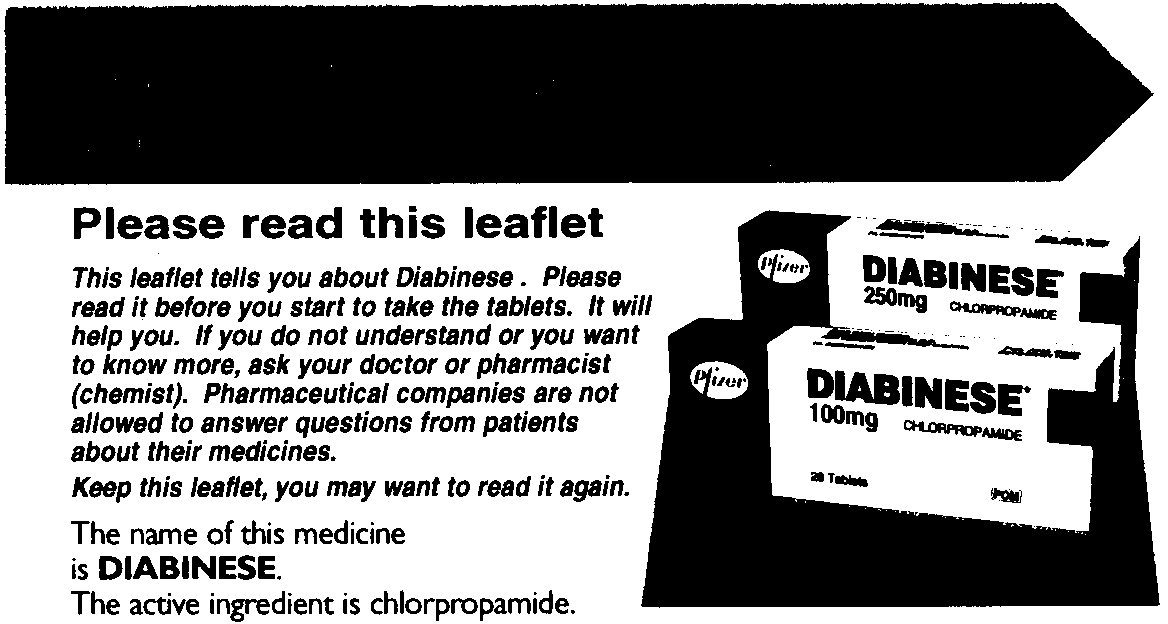
Patient Information Leaflet

What is in your medicine? Diabinese tablets are white and come in two different strengths. Each tablet contains either 100mg or 250mg chlorpropamide. Each tablet also contains alginic acid, maize starch, magnesium stearate and sodium lauryl sulphate. The tablets are free of gluten, dyes, lactose and other sugars. The tablets come in packs of 28. Product Licence Holder and Manufacturer Pfizer Limited, Sandwich, Kent CT13 9NJ What type of medicine is Diabinese? Diabinese is one of a group of medicines called sulphonylureas. It is an oral antidiabetic medicine. What is your medicine for? Diabinese is used to lower blood sugar (glucose) in patients with non-insulin-dependent diabetes mellitus (NIDDM for short). This is also called maturity-onset (adult) or Type II diabetes. It is always used in conjunction with a diet which restricts sugars and fats. This medicine is also used to treat diabetes insipidus. It reduces the large amount of urine produced in this condition. Before you use Diabinese Be sure to tell your doctor if:
|
If any of the above applies to you this medicine may not be suitable for you to use. Your doctor will advise you. Can I drive when taking this medicine? All diabetic patients who drive need to be particularly careful to avoid hypoglycaemia (see section "Does your medicine cause undesirable effects?"). If you are affected do not drive or operate machinery. Can Diabinese be taken with other medicines? A number of medicines may interact with Diabinese and affect diabetic control. You should tell your doctor if you are taking any of these medicines or any other medicines which you are unsure about:-
|

MORE INFORMATION ON DIABINESE
Alcoholic drinks (wine beer spirits) may upset diabetic control. In some people Diabinese reacts with alcohol and causes a hot flush in the face How to take your medicine Diabinese should only be taken by mouth Patients with NIDDM The usual adult dose is one 250mg tablet taken each morning with breakfast The maximum dose is 500mg each day If you are elderly you may need to start treatment with 100mg each morning with breakfast Patients with diabetes insipidus The usual starting dose is one 100mg tablet taken each morning with breakfast. Doctors sometimes prescribe different doses to these. The label on the pack will tell you what dose YOU should take. If you are still not sure ask your doctor or pharmacist. Do not stop taking the tablets without seeing your doctor. Stopping the medicine may make the diabetes worse What if you take too many tablets? If you accidentally take too many tablets seek medical advice in all cases. If you suffer faintness, confusion, sweating or shaking these may be symptoms of low blood sugar. You should eat or drink something sugary. If fits or loss of consciousness occur, emergency action will be needed. What if you miss a tablet? If you miss a tablet take one before your next meal. Does your medicine cause undesirable effects? Serious undesirable effects are rare:-
|
If you suffer any of the effects listed below tell your doctor if they are troublesome, severe or do not wear off as treatment goes on:-
The following effects are very rare and you should check with your doctor as soon as possible If any occur:-
HYPERSENSITIVITY EFFECTS A few patients are allergic to medicines, this may cause sudden wheeziness, rash or itching all over the body. If any of these effects occur when you take Diabinese you should check with your doctor immediately. It is important to tell your doctor or pharmacist if you suffer any other undesirable effects which are not listed above. Look after your medicine This treatment is for YOU. Do not give it to others. It may not suit them. Do not take this medicine after the date stamped on the pack. Where to keep your medicine
Further information If you have any questions or are not sure about anything, ask your doctor or pharmacist. The information in this leaflet is about Diabinese only. Date Diabinese leaflet United Kingdom last revised - November 1994 © Pfizer Limited 1995 |
